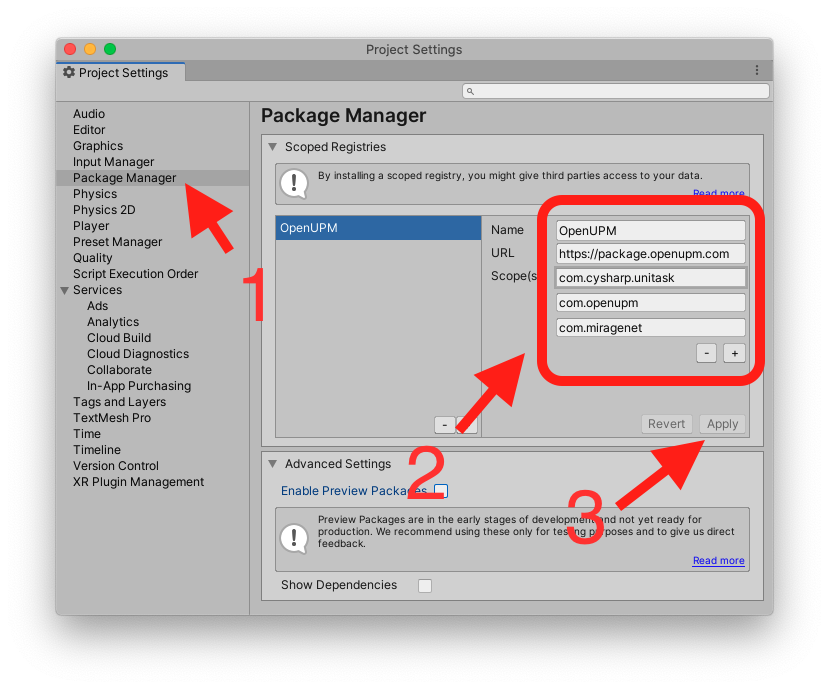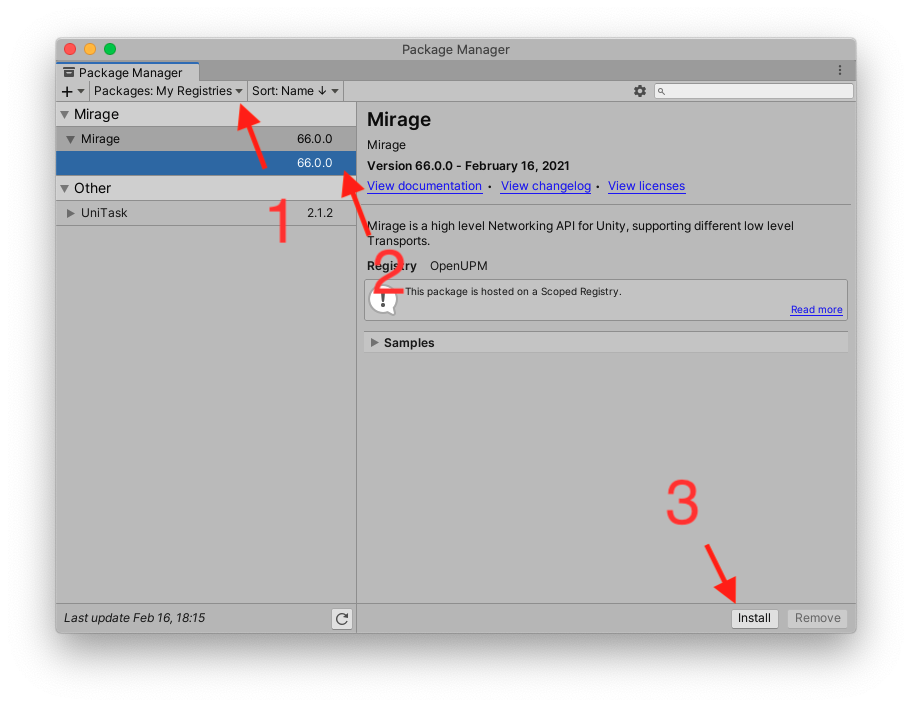Mirage is a high level Networking API for Unity.
Mirage is built and tested for MMO Scale Networking by the developers of Cubica.
Mirage is optimized for ease of use and probability of success.
With Mirage the objects in the client are mirror images of the objects in the server. Mirage provides all the tools necessary to keep them in sync and pass messages between them.
To install Mirage, follow these steps:
- Install Unity 2020.1.17 or later
- Start a new project or open your existing one
- Add openupm registry. Click on the menu Edit -> Project settings..., and add a scoped registry like so:

- Close the project settings
- Open the package manager. Click on menu Window -> Package Manager and select "Packages: My Registries", select the latest version of Mirage and click install, like so:

- You may come back to the package manager to unistall Mirage or upgrade it.
When migrating a project from Mirror to Mirage, these will be the most notable differences.
| Mirage | Mirror |
|---|---|
| Install via Unity Package Manager | Install from Asset Store |
| Errors are thrown as exceptions | Errors are logged |
[ServerRpc] |
[Command] |
[ClientRpc(target=Client.Owner)] |
[TargetRpc] |
Subscribe to events in NetworkServer |
Override methods in NetworkManager |
Subscribe to events in NetworkClient |
Override methods in NetworkManager |
Subscribe to events in NetworkIdentity |
Override methods in NetworkBehaviour |
| Methods use PascalCase (C# guidelines) | No consistency |
NetworkTime available in NetworkBehaviour |
NetworkTime is global static |
| Send any data as messages | Messages must implement NetworkMessage |
| Supports Unity 2019.3 or later | Supports Unity 2018.4 or later |
Mirage has many new features
- Mirage supports fast domain reload
- Components can be added in child objects
- Your client can connect to multiple servers. For example chat server and game server
- Modular, use only the components you need.
- Error handling
- Version defines
- Server Rpcs can return values
- The default transport features DoS prevention
- The default transport has CRC64 integrity check
- Mirage provides unreliable channel out of the box
If you look under the hood, the code base has some significant differences based on the core values of each project
- Mirage follows the SOLID principles.
- Mirage avoids singletons and static state in general.
- Mirage has high
- Mirage has low
- Mirage values code quality, Mirror values API stability
If you want to contribute to Mirage, follow these steps:
- Install git
- clone this repo
- Open in unity 2020.1.x or later
- Install git or use your favorite git client
- as administrator, clone this repo with symbolic links support:
It you don't want to use administrator, add symlink support to your account. If you don't enable symlinks, you will be able to work on Mirage but Unity will not see the examples.
git clone -c core.symlinks=true https://github.com/MirageNet/Mirage.git
- Open in unity 2019.4.x or later
Here is a list of some transports supported by NG and how they compare to each other
| Kcp | Websocket | Steam | LiteNetLibNG | IgnoranceNG | |
|---|---|---|---|---|---|
| CCU | 1000+ | ? | ? | ? | ? |
| Protocol | UDP | TCP | UDP | UDP | UDP |
| Unreliable | ✅ | ✅ | ✅ | ✅ | |
| WebGL | ✅ | ||||
| Mobile | ✅ | ? | ? | ||
| CPU | LOW | HIGH | ? | ? | ? |
| NAT Punch | ✅ | ||||
| Encryption | ✅ | ✅ | |||
| IPV6 | ✅ | ✅ | ? | ? | ? |
| Managed | ✅ | ✅ | ✅ | ||
| Based on | KCP | Websockets | Steam Game Networking Sockets | LiteNetLib | ENet |
There are several ways to contribute to this project:
- Pull requests for bug fixes and features are always appreciated.
- Pull requests to improve the documentation is also welcome
- Make tutorials on how to use this
- Test it and open issues
- Review existing pull requests
- Donations
When contributing code, please keep these things in mind:
- KISS principle. Everything needs to be as simple as possible.
- An API is like a joke, if you have to explain it is not a good one. Do not require people to read the documentation if you can avoid it.
- Follow C# code conventions.
- Follow SOLID principles as much as possible.
- Keep your pull requests small and obvious, if a PR can be split into several small ones, do so.




